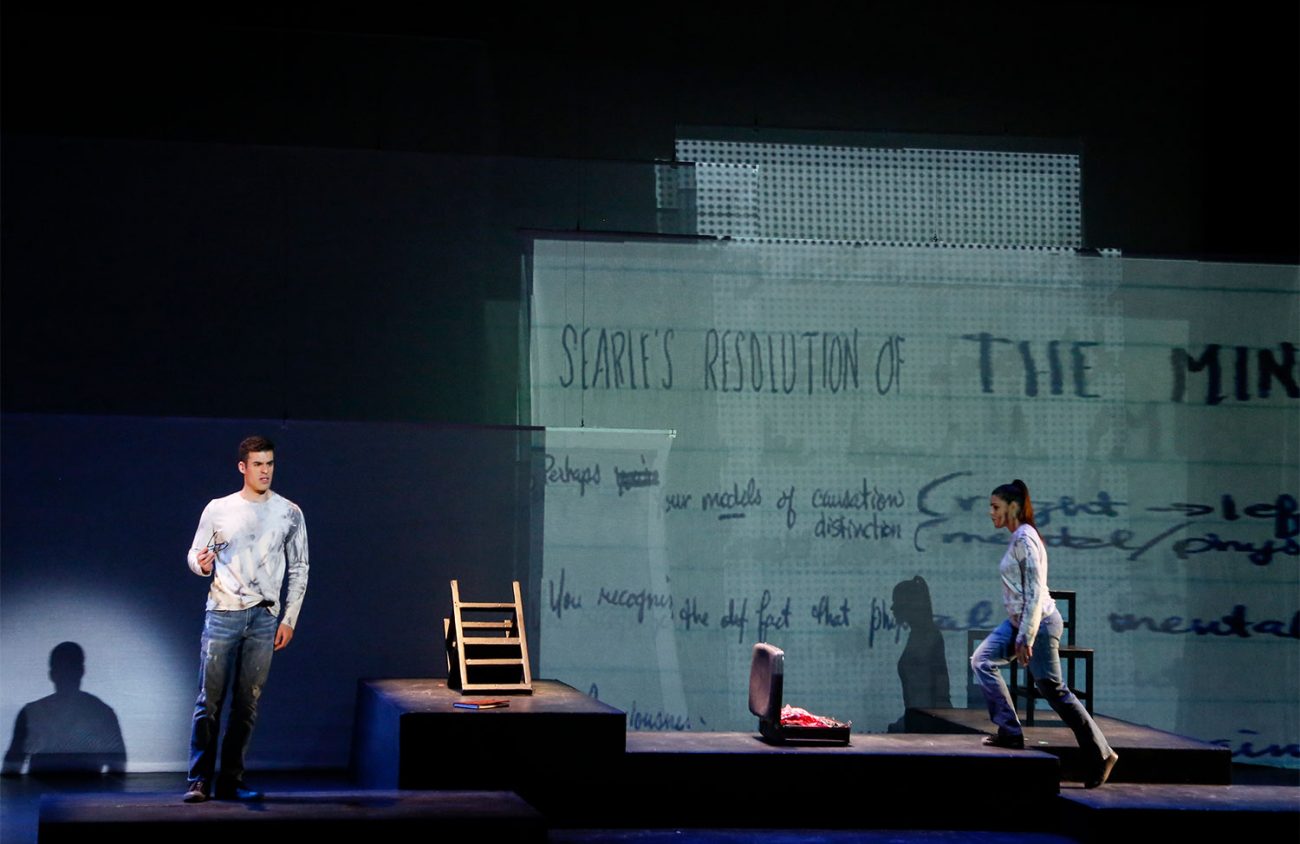When Kimberly Reed was growing up in Helena, Montana, “it was hard to be an opera fan,” she remembers. There were no major opera companies around, but her father “listened to the Metropolitan Opera every Saturday on Montana NPR, and I was right there with him,” Reed recalls. Opera “was always there — it was part of me growing up.”
After leaving Montana for college in California, Reed — who’s the co-librettist and video projection designer for Eugene Opera’s upcoming production As One, which plays Friday and Sunday, May 17 and 19, at the Hult Center’s Soreng Theater — gravitated to filmmaking. With As One and other projects, Reed is shifting from filmmaker to opera maker, the latest in a lifetime of transitions that inspired As One, which the Chicago Tribune called “the hottest new American opera of recent years.”
As the first commercially released transgender filmmaker, Reed has earned prestigious fellowships as well as features on the Oprah Winfrey Show, CNN, NPR and the Moth Radio Hour. Her recent documentary Dark Money earned wide accolades for its portrait of how corporations corrupted her home state’s democratic elections.
After seeing Reed’s award-winning 2008 autobiographical film Prodigal Sons, which told the story of Reed’s return to Montana for her 20th high school reunion as a trans woman, composer Laura Kaminsky asked Reed to create a film that she would score.
Reed wanted As One to be different. “Prodigal Sons was autobiographical, and I was tired of talking about myself,” she explains. “I was wanting to move in different directions, thinking of creative ways to abstract my personal experience.”
As the project evolved into an opera, they brought on renowned librettist Mark Campbell to co-create the text with Reed. Kaminsky then composed musical settings for the 15 scenes. “The music is pretty. The singing is lovely. It’s funny,” Matthew Andrews writes in Oregon ArtsWatch about the Portland production.
The story traces the journey of its protagonist, Hannah, from her small-town origins to college to various encounters (some dangerous) and finally to another country, where she arrives at crucial realizations about her own life.
Two singers share the role, a baritone (Robert Wesley Mason) playing pre-transition Hannah and the excellent Portland-based mezzo-soprano Hannah Penn (who played the role in Portland Opera’s recent production) as post-transition Hannah. Her transitions in space and time are depicted in Reed’s films, projected across five screens that transport the character to different settings.
The team wanted to avoid making a “message opera.” The word “transgender” never appears.
“We both had a sensibility grounded in the real, accessible, modern-day quiet dramas we all go through in our lives,” Reed says.
Reed’s stylistically varied projections serve different functions. “Sometimes they underline a time and place realistically,” she says. “Other times they operate in more surreal fashion, and in others, the role of the video is to provide commentary — other ways of elucidating the music and text you’re experiencing.”
Using video rather than props to set the scenes is “much more flexible creatively” than building and employing standard props, she says. They also make As One portable and affordable to smaller companies — one reason why, since its 2014 premiere, it’s become the most produced new opera in North America.
Despite As One’s intimate storyline and 21st-century projection tech, Reed believes it’s ideally suited for opera.
“I think that opera lends itself to self reflection,” she muses. “Think of almost any aria where the scene clears out and the world drops away and we have one character expressing their emotions in song and text. That’s almost always self-reflective — and that’s what Hannah’s journey is all about.”
The opera has earned critical raves from The New York Times, L.A. Times, San Francisco Classical Voice, Washington Post, Seattle Times and more. Reed has seen its effect on audiences in previous productions.
“This story about growing and changing is a very fundamental human story that so many people relate to,” she says. “Some people relate to it on the plane of gender, sometimes they don’t, but we all go through that process. In the processing of As One, hopefully what happens is that audiences replicate the transformation that Hannah undergoes. To watch that happen, to see it in people’s eyes after they experience it, is a tremendous joy. That’s why we all made the piece.”
As One is only the latest example of classically oriented vocal music expanding beyond restrictive gender categories. Portland State University just started its Queer Opera Experience to give queer students an inclusive platform to perform and to recast heterocentric traditional operas to include diverse queer experiences.
San Francisco’s Convivium and New Voices Bay Area Chorus specialize in breaking gender restrictions. Portland and many other cities now have gay men’s choruses.
And Eugene’s Soromundi Lesbian Chorus, whose annual spring concert happens next Saturday, May 25, at the Hult’s Soreng Theater, highlights the varied stories, identities and experiences of Eugene’s vibrant lesbian community.
More vocal music is onstage this Friday, May 17, at Central Lutheran Church when the UO’s Musicking Conference presents Quirino Colombani’s 1701 oratorio The Martyrdom of Saint Cecilia. And on Saturday afternoon, May 18, at the Atrium, Byrdsong sings and plays more early music from 16th through the 18th centuries celebrating spring.
